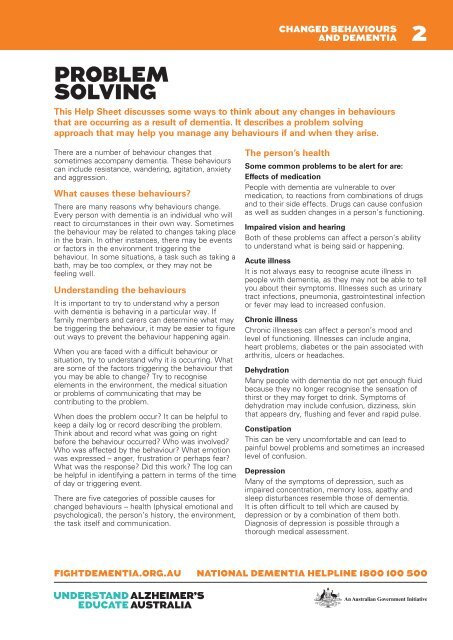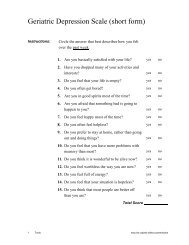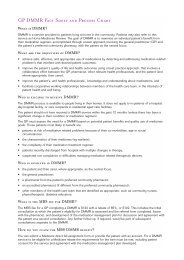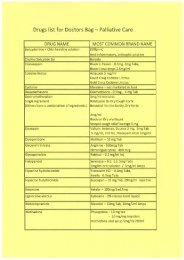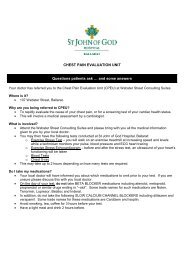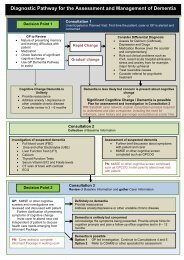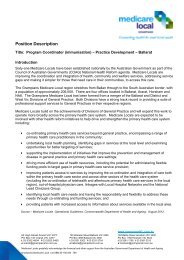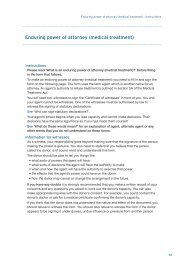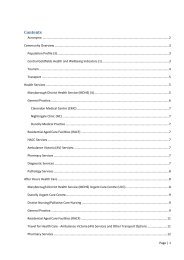Problem solving help sheet PDF
Problem solving help sheet PDF
Problem solving help sheet PDF
You also want an ePaper? Increase the reach of your titles
YUMPU automatically turns print PDFs into web optimized ePapers that Google loves.
CHANGED BEHAVIOURSAND DEMENTIA2PROBLEMSOLVINGThis Help Sheet discusses some ways to think about any changes in behavioursthat are occurring as a result of dementia. It describes a problem <strong>solving</strong>approach that may <strong>help</strong> you manage any behaviours if and when they arise.There are a number of behaviour changes thatsometimes accompany dementia. These behaviourscan include resistance, wandering, agitation, anxietyand aggression.What causes these behaviours?There are many reasons why behaviours change.Every person with dementia is an individual who willreact to circumstances in their own way. Sometimesthe behaviour may be related to changes taking placein the brain. In other instances, there may be eventsor factors in the environment triggering thebehaviour. In some situations, a task such as taking abath, may be too complex, or they may not befeeling well.Understanding the behavioursIt is important to try to understand why a personwith dementia is behaving in a particular way. Iffamily members and carers can determine what maybe triggering the behaviour, it may be easier to figureout ways to prevent the behaviour happening again.When you are faced with a difficult behaviour orsituation, try to understand why it is occurring. Whatare some of the factors triggering the behaviour thatyou may be able to change? Try to recogniseelements in the environment, the medical situationor problems of communicating that may becontributing to the problem.When does the problem occur? It can be <strong>help</strong>ful tokeep a daily log or record describing the problem.Think about and record what was going on rightbefore the behaviour occurred? Who was involved?Who was affected by the behaviour? What emotionwas expressed – anger, frustration or perhaps fear?What was the response? Did this work? The log canbe <strong>help</strong>ful in identifying a pattern in terms of the timeof day or triggering event.There are five categories of possible causes forchanged behaviours – health (physical emotional andpsychological), the person’s history, the environment,the task itself and communication.The person’s healthSome common problems to be alert for are:Effects of medicationPeople with dementia are vulnerable to overmedication, to reactions from combinations of drugsand to their side effects. Drugs can cause confusionas well as sudden changes in a person’s functioning.Impaired vision and hearingBoth of these problems can affect a person’s abilityto understand what is being said or happening.Acute illnessIt is not always easy to recognise acute illness inpeople with dementia, as they may not be able to tellyou about their symptoms. Illnesses such as urinarytract infections, pneumonia, gastrointestinal infectionor fever may lead to increased confusion.Chronic illnessChronic illnesses can affect a person’s mood andlevel of functioning. Illnesses can include angina,heart problems, diabetes or the pain associated witharthritis, ulcers or headaches.DehydrationMany people with dementia do not get enough fluidbecause they no longer recognise the sensation ofthirst or they may forget to drink. Symptoms ofdehydration may include confusion, dizziness, skinthat appears dry, flushing and fever and rapid pulse.ConstipationThis can be very uncomfortable and can lead topainful bowel problems and sometimes an increasedlevel of confusion.DepressionMany of the symptoms of depression, such asimpaired concentration, memory loss, apathy andsleep disturbances resemble those of dementia.It is often difficult to tell which are caused bydepression or by a combination of them both.Diagnosis of depression is possible through athorough medical assessment.FIGHTDEMENTIA.ORG.AUNATIONAL DEMENTIA HELPLINE 1800 100 500
2CHANGED BEHAVIOURSAND DEMENTIAABOUTDEMENTIAFatigueDisrupted sleep patterns can cause angryor agitated behaviour.Physical discomfortThe person may be hungry or bloated or need togo to the toilet, be too cold or too warm.Unmet emotional and physical needsPeople with dementia still want to feel useful andneeded, that they belong, are included and that theirexisting skills are utilized. A person may react in anegative way if any of these needs are not addressed.The person’s historySometimes the person may think in the past and thiscan explain what appears to be an unusual behaviour.For instance, the person may be looking for the toiletand go out the back thinking of the outside toilet theyused as a child.The environmentEnvironment too largeSometimes the physical space in which a personwith dementia is living is overwhelming.Too much clutterSometimes there is too much in theenvironment for the person to absorb,and they may become overwhelmed.Excessive stimulationWhen there is too much going on in theenvironment, such as music or television in thebackground during conversation or there are toomany people around, the behaviour of someonewith dementia may change.Confusing sensory environmentsLighting, visual contrasts between floors and walls,the use of colours can all affect a person’sbehaviour and level of functioning. Inadequatelevels of light may affect their ability to concentratewhile eating. Patterned floor tiles can look like steps,causing the person to trip or become uncertain.Glare from direct sunlight or a highly polishedfloor can affect a person’s ability to see.Shadows can contribute to hallucinations.Changing routinesPeople with dementia need a certain amount ofroutine and daily structure on which they can depend.This consistency is important in <strong>help</strong>ing to minimisethe amount of stress they may be experiencing.Unfamiliar environmentAn environment that is new or unfamiliar is morelikely to be confusing for a person with dementiabecause they experience problems with newlearning, memory and perception.The taskTask too complicatedSometimes people with dementia are asked to dotasks that are now too difficult due to theprogressive nature of dementia, even though theymay have been able to do them previously.Task unfamiliarPeople with dementia gradually lose their ability tolearn new tasks or skills. Expecting that they willlearn may place an unrealistic demand on them.Causes related to communicationPeople with dementia may become angry or agitatedbecause they do not understand what is expected ofthem or they misunderstand what others may besaying. They may also feel frustrated with theirinability to make themselves understood.<strong>Problem</strong> <strong>solving</strong>Make a plan and try it. Develop a list of alternativestrategies for responding to the behaviour orsituation. Be creative. Have someone else look at thesituation and give suggestions. Think about thestrategies you have identified. Decide on the one youare going to try first.Review the strategy. <strong>Problem</strong> <strong>solving</strong> is a process oftrial and error. There are no simple solutions. If thenew strategies you tried did not reduce the changedbehaviour as you had planned, try other strategies.Who can <strong>help</strong>?Discuss with the doctor your concerns aboutbehaviour changes, and their impact on you.FURTHER INFORMATIONAlzheimer’s Australia offers support, information,education and counselling. Contact the NationalDementia Helpline on 1800 100 500, or visit ourwebsite at fightdementia.org.auFor language assistance phone theTelephone Interpreter Service on 131 450This publication provides a general summary only of the subject mattercovered. People should seek professional advice about their specific case.Alzheimer’s Australia is not liable for any error or omission in this publication.© Alzheimer’s Australia 2012Reviewed March 2012


